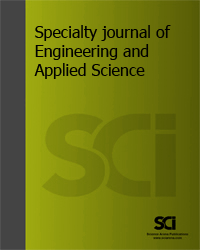Original research papers, review articles, technical reports and short communications ., can be submitted on the understanding that the work is not previously published or under consideration for publication elsewhere.
SUBMISSION OF MANUSCRIPT
It is recommended to submit manuscript through Email.
STYLE OF MANUSCRIPT
Text Style
Font: Times new roman
Font Size: 12
Line spacing: 2.0
The journal’s language is English.
British English or American English spelling and terminology may be used in article. Please provide your manuscript in double-spaced, Times and New Roman font (size 12) left alignment, Word format. Contributors who are not native English speakers are strongly encouraged to ensure that a colleague fluent in the English language, if none of the authors is so, has reviewed their manuscript. The journal has an option to facilitate language correction on manuscripts if the Authors are not sure about the correctness of manuscript grammar and spelling.
English Language Editing Service
Prior to submission, authors who believe their manuscripts would benefit from professional editing, especially from non-English speaking countries, are encouraged to use a language-editing service. A sample list of English language editing companies can be found here.
Manuscript should be written in clear, concise and grammatically correct English. Indent new paragraphs. The manuscript should be presented in the following order:
Key Words
Please provide 5 to 10 key words in alphabetical order separated with semicolons, not included in the title. Scientific or systematic name of plants and fungi etc. should be written in italic. eg. Triticum aestivum; in vitro; in vivo.
Abbreviations
Abbreviations and their explanations should be collected alphabetically arranged in a list. Examples: BA- 6-benzylaminopurine; NAA-naphthaleneacetic acid. Some commonly used abbreviations (e.g., DNA; PCR) do not have to be explained.
Abstract
Please provide a short abstract between 150- 250 words. The abstract should not contain any undefined abbreviations or unspecified references. Usually, the abstract summarises the work reported and does not contain background information or speculative statements.
Introduction
This section should argue the case for your study, outlining only essential background, but should not include either the findings or the conclusions. It should not be a review of the subject area, but should finish with a clear statement of the question being addressed. Please provide a context for the report with respect to previous work done in the field. The literature should be cited. Please do not insert page number in your manuscript with MS Word insert page facility.
Materials and Methods
Please provide sufficient methodological details to allow a competent person to repeat the work.
Results and Discussion
This should highlight the results and the significance of the results and place them in the context of other work. The final paragraph ought to provide a resume of the main conclusions. Normally a comparison between your results and results from previous works should be given in the Discussion.
Headings: Headings should be in upper case and in bold type. Sub-headings should be in lower case and Sub-Subheadings should be in lower case and in italics.
Figures: You must also supply a high-quality hard-copy of all figures and tables in case we need to scan. A figure legend should be supplied.
Tables: Number in order of mention in the text and Table should be in text form not shown as an image.
References
Cross-referencing
In the text, a reference identified by means of an author’s name should be followed by the date of the reference in parentheses. When there are more than two authors, only the first author’s name should be mentioned, followed by ‘et al.’. In the event that an author cited has had two or more works published during the same year, the reference, both in the text and in the reference list, should be identified by a lower case letter. All the below examples can be used in the text: According Mark (1986); (Smith, 1987a, b), (Jones, 1986; Elders et al., 1988), (Bullen and Bennett, 1990).
1. Journal article:
Smith J, Jone, MJ, Houghton LD. 1999. Future of health insurance. N Engl J Med 965:325–329
2. Journal issue with issue editor:
Smith J. 1998. Rodent genes. Mod Genomics J 14(6):126–233
3. Book chapter:
Brown B, Aaron M. 2001. The politics of nature. In: Smith J (ed) The rise of modern genomics, 3rd edn. Wiley, New York
4. Paper presented at a conference:
Chung S-T, Morris RL. 1978. Isolation and characterization of plasmid deoxyribonucleic acid from Streptomyces fradiae. Paper presented at the 3rd international symposium on the genetics of industrial microorganisms, University of Wisconsin, Madison, 4–9 June 1978
5.Proceedings as a book (in a series and subseries):
Zowghi D, et al. 1996. A framework for reasoning about requirements in evolution. In: Foo N, Goebel R (eds) PRICAI’96: topics in artificial intelligence. 4th Pacific Rim conference on artificial intelligence, Cairns, August 1996. Lecture notes in computer science (Lecture notes in artificial intelligence), vol 1114. Springer, Berlin Heidelberg New York, p 157
6. Proceedings with an editor (without a publisher):
Aaron M. 1999 The future of genomics. In: Williams H (ed) Proceedings of the genomic researchers, Boston, 1999
Copyright and Permissions
By submitting a manuscript to the editor or publisher you are deemed to have granted permission to publish the manuscript.
PROOFS
Proofs will be sent via e-mail as an Acrobat PDF (Portable Document Format) file. Acrobat Reader will be required in order to read the PDF. This software can be downloaded from the following website:
http://www.adobe.com/products/acrobat/readstep2.html
This will enable the file to be opened, read on screen and printed out in order for any corrections to be added.


